2001 HONDA CR-V wheel
[x] Cancel search: wheelPage 70 of 326
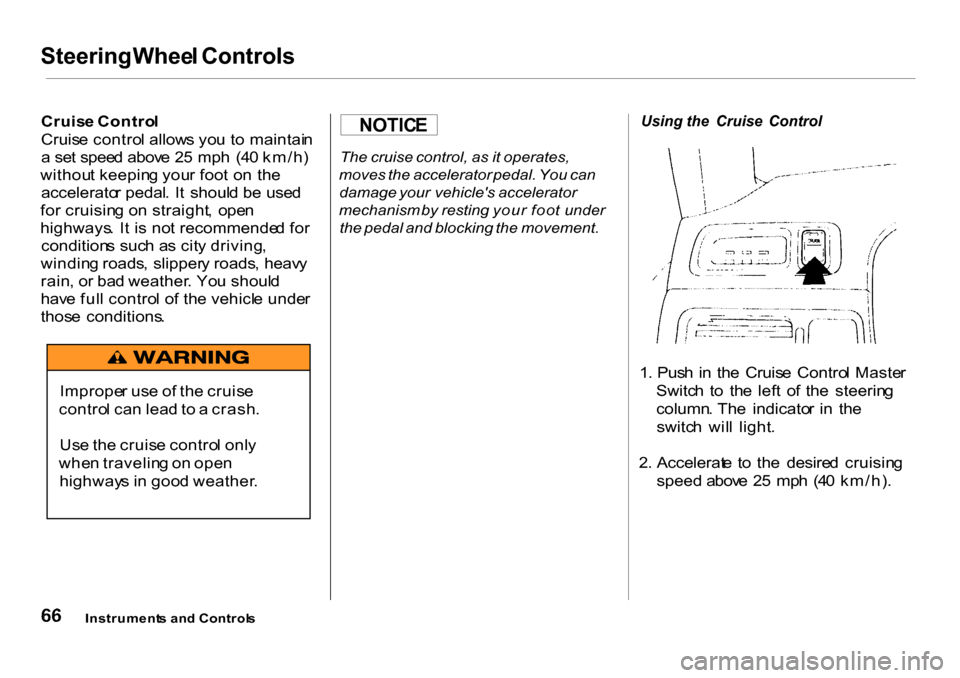
Steering
Wheel Controls
Cruis e Contro l
Cruis e contro l allow s yo u t o maintai n
a se t spee d abov e 2 5 mp h (4 0 km/h )
withou t keepin g you r foo t o n th e
accelerato r pedal . I t shoul d b e use d
fo r cruisin g o n straight , ope n
highways . I t i s no t recommende d fo r
condition s suc h a s cit y driving ,
windin g roads , slipper y roads , heav y
rain , o r ba d weather . Yo u shoul d
hav e ful l contro l o f th e vehicl e unde r
thos e conditions . The
cruise control, as it operates,
moves the accelerator pedal. You can
damage your vehicle's accelerator
mechanism by resting your foo t under
the pedal and blocking the movement.
Using
the Cruise Control
1 . Pus h i n th e Cruis e Contro l Maste r
Switc h t o th e lef t o f th e steerin g
column . Th e indicato r i n th e
switc h wil l light .
2 . Accelerat e t o th e desire d cruisin g
speed above 2 5 mp h (40 km/h) .
Instrument s an d Control s
Imprope
r us e o f th e cruis e
contro l ca n lea d to a crash .
Us e th e cruis e contro l onl y
whe n travelin g o n ope n
highway s i n goo d weather .
NOTIC
E
Page 71 of 326
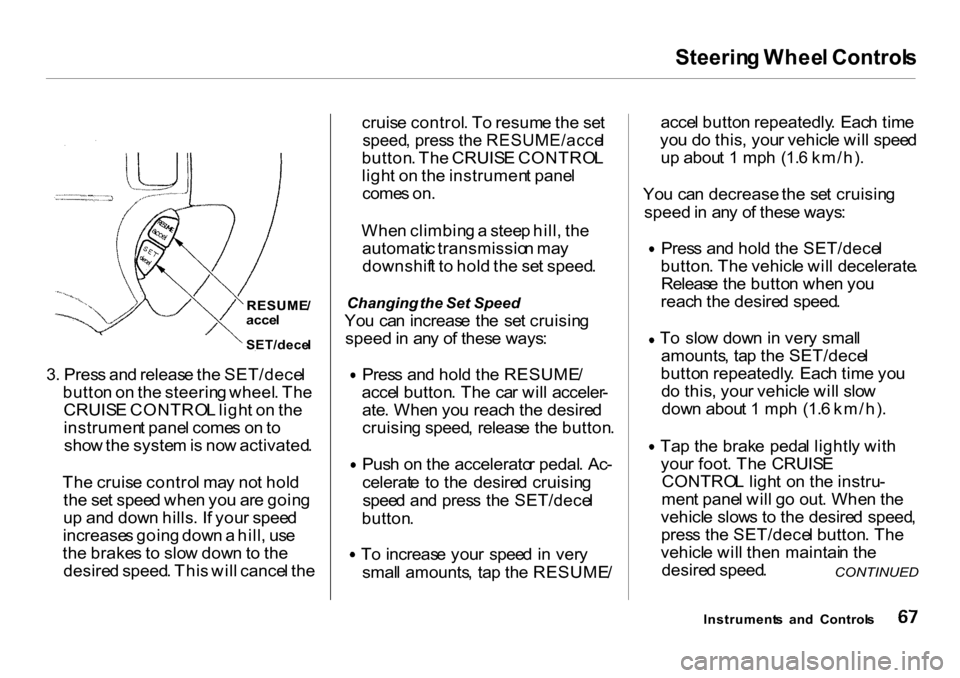
Steerin
g Whee l Control s
3 . Pres s an d releas e th e SET/dece l
butto n o n th e steerin g wheel . Th e
CRUIS E CONTRO L ligh t o n th e
instrumen t pane l come s o n to
sho w th e syste m is no w activated .
Th e cruis e contro l ma y no t hol d
th e se t spee d whe n yo u ar e goin g
u p an d dow n hills . I f you r spee d
increase s goin g dow n a hill , us e
th e brake s t o slo w dow n to th e
desire d speed . Thi s wil l cance l th e cruis
e control . T o resum e th e se t
speed , pres s th e RESUME/acce l
button . Th e CRUIS E CONTRO L
ligh t o n th e instrumen t pane l
come s on .
Whe n climbin g a stee p hill , th e
automati c transmissio n ma y
downshif t t o hol d th e se t speed .
Changing the Set Speed
Yo u ca n increas e th e se t cruisin g
speed in an y o f thes e ways : Pres
s an d hol d th e RESUME /
acce l button . Th e ca r wil l acceler -
ate . Whe n yo u reac h th e desire d
cruisin g speed , releas e th e button . Pus
h o n th e accelerato r pedal . Ac -
celerat e t o th e desire d cruisin g
spee d an d pres s th e SET/dece l
button . T
o increas e you r spee d in ver y
smal l amounts , ta p th e RESUME /acce
l butto n repeatedly . Eac h tim e
yo u d o this , you r vehicl e wil l spee d
u p abou t 1 mp h (1. 6 km/h) .
Yo u ca n decrease the se t cruisin g
speed in an y o f thes e ways : Pres
s an d hol d th e SET/dece l
button . Th e vehicl e wil l decelerate .
Releas e th e butto n whe n yo u
reac h th e desire d speed .
T o slo w dow n in ver y smal l
amounts , ta p th e SET/dece l
butto n repeatedly . Eac h tim e yo u
d o this , you r vehicl e wil l slo w
dow n abou t 1 mp h (1. 6 km/h) .
Ta p th e brak e peda l lightl y wit h
you r foot . Th e CRUIS E
CONTRO L ligh t o n th e instru -
men t pane l wil l g o out . Whe n th e
vehicl e slow s t o th e desire d speed ,
pres s th e SET/dece l button . Th e
vehicl e wil l the n maintai n th e
desire d speed .
Instrument s an d Control s
CONTINUED
RESUME
/
acce l
SET/dece l
Page 74 of 326
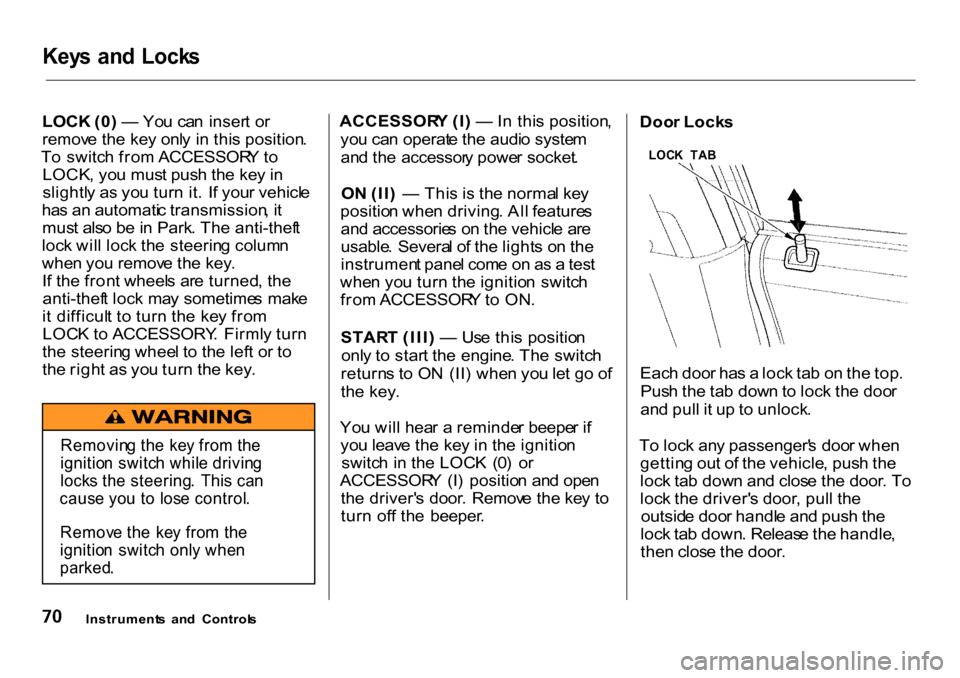
Key
s an d Lock s
LOCK (0) — Yo u ca n inser t o r
remov e th e ke y onl y i n thi s position .
T o switc h fro m ACCESSOR Y to
LOCK , yo u mus t pus h th e ke y i n
slightl y a s yo u tur n it . I f you r vehicl e
ha s a n automati c transmission , i t
mus t als o b e in Park . Th e anti-thef t
loc k wil l loc k th e steerin g colum n
whe n yo u remov e th e key .
I f the fron t wheel s ar e turned , the
anti-thef t loc k ma y sometime s mak e
i t difficul t t o tur n th e ke y fro m
LOC K to ACCESSORY . Firml y tur n
the steerin g whee l t o th e lef t o r t o
th e righ t a s yo u tur n th e key . ACCESSOR
Y (I ) — In thi s position ,
yo u ca n operat e th e audi o syste m
an d th e accessor y powe r socket .
O N (II ) — Thi s i s th e norma l ke y
positio n whe n driving . Al l feature s
an d accessorie s o n th e vehicl e ar e
usable . Severa l o f th e light s o n the
instrumen t pane l com e o n a s a tes t
whe n yo u tur n th e ignitio n switc h
fro m ACCESSOR Y to ON .
STAR T (III ) — Us e thi s positio n
onl y t o star t th e engine . Th e switc h
return s t o O N (II ) whe n yo u le t g o o f
th e key .
Yo u wil l hea r a reminde r beepe r i f
yo u leav e th e ke y i n th e ignitio n
switc h i n th e LOC K (0 ) o r
ACCESSOR Y (I ) positio n an d ope n
th e driver' s door . Remov e the key t o
tur n of f th e beeper . Doo
r Lock s
Eac h doo r ha s a loc k ta b o n th e top .
Pus h th e ta b dow n to loc k th e doo r
an d pul l i t u p to unlock .
T o loc k an y passenger' s doo r whe n
gettin g ou t o f th e vehicle , pus h th e
loc k ta b dow n an d clos e th e door . T o
loc k th e driver' s door , pul l th e
outsid e doo r handl e an d pus h th e
loc k ta b down . Releas e th e handle ,
the n clos e th e door .
Instrument s an d Control s
LOC
K TA B
Removin g th e ke y fro m th e
ignitio n switc h whil e drivin g
lock s th e steering . Thi s ca n
caus e yo u t o los e control .
Remov e th e ke y fro m th e
ignitio n switc h onl y whe n
parked .
Page 163 of 326
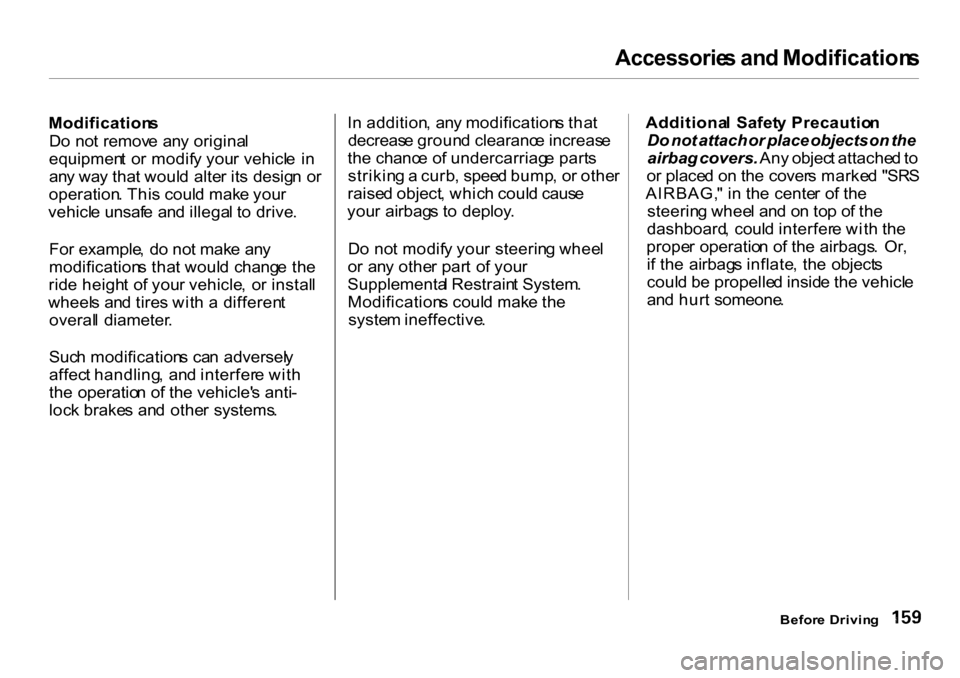
Accessorie
s an d Modification s
Modification s
D o no t remov e an y origina l
equipmen t o r modif y you r vehicl e i n
an y wa y tha t woul d alte r it s desig n o r
operation . Thi s coul d mak e you r
vehicl e unsaf e an d illega l t o drive .
Fo r example , d o no t mak e an y
modification s tha t woul d chang e th e
rid e heigh t o f you r vehicle , o r instal l
wheel s an d tire s wit h a differen t
overal l diameter .
Suc h modification s ca n adversel y
affec t handling , an d interfer e wit h
th e operatio n o f th e vehicle' s anti -
loc k brake s an d othe r systems . I
n addition , an y modification s tha t
decreas e groun d clearanc e increas e
th e chanc e o f undercarriag e part s
strikin g a curb , spee d bump , o r othe r
raise d object , whic h coul d caus e
you r airbag s t o deploy .
D o no t modif y you r steerin g whee l
o r an y othe r par t o f you r
Supplementa l Restrain t System .
Modification s coul d mak e th e
syste m ineffective . Additiona
l Safet y Precautio n
Do not attach or place objects on the
airbag covers. Any objec t attache d to
o r place d o n th e cover s marke d "SR S
AIRBAG, " i n th e cente r o f th e
steerin g whee l an d o n to p o f th e
dashboard , coul d interfer e wit h th e
prope r operatio n o f th e airbags . Or ,
i f th e airbag s inflate , th e object s
coul d b e propelle d insid e th e vehicl e
an d hur t someone .
Befor e Drivin g
Page 168 of 326
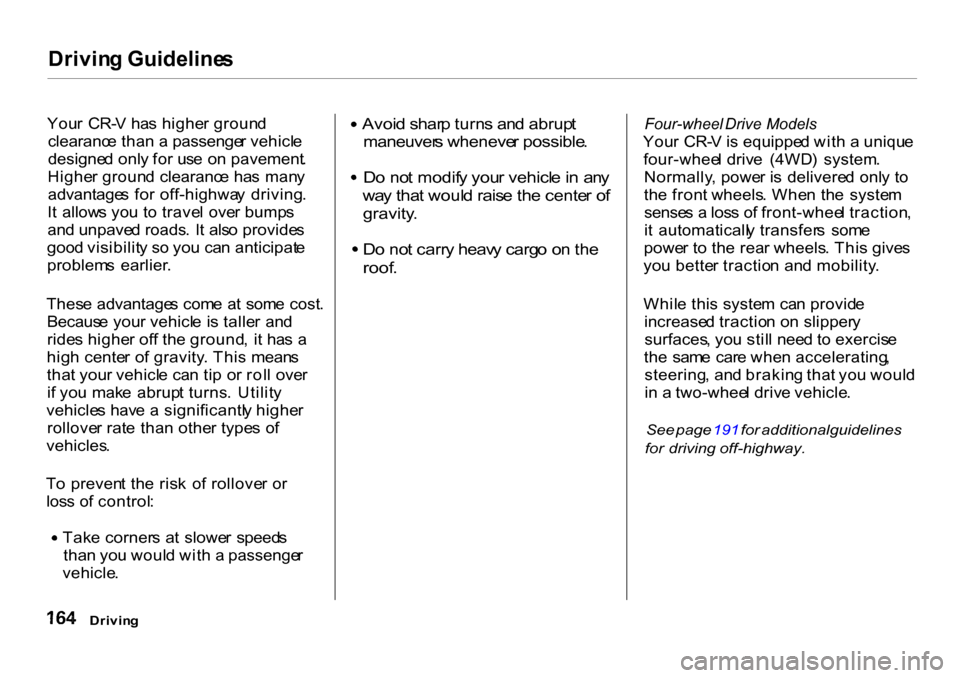
Drivin
g Guideline s
You r CR- V ha s highe r groun d
clearanc e tha n a passenge r vehicl e
designe d onl y fo r us e o n pavement .
Highe r groun d clearanc e ha s man y
advantage s fo r off-highwa y driving .
I t allow s yo u t o trave l ove r bump s
an d unpave d roads . I t als o provide s
goo d visibilit y s o yo u ca n anticipat e
problem s earlier .
Thes e advantage s com e a t som e cost .
Becaus e you r vehicl e i s talle r an d
ride s highe r of f th e ground , i t ha s a
hig h cente r o f gravity . Thi s mean s
tha t you r vehicl e ca n ti p o r rol l ove r
i f yo u mak e abrup t turns . Utilit y
vehicle s hav e a significantl y highe r
rollove r rat e tha n othe r type s o f
vehicles .
T o preven t th e ris k o f rollove r o r
los s o f control : Tak
e corner s a t slowe r speed s
tha n yo u woul d wit h a passenge r
vehicle .
Avoi
d shar p turn s an d abrup t
maneuver s wheneve r possible . D
o no t modif y you r vehicl e in an y
wa y tha t woul d rais e th e cente r o f
gravity .
D
o no t carr y heav y carg o o n th e
roof .
Four-wheel
Drive Models
You r CR- V is equippe d wit h a uniqu e
four-whee l driv e (4WD ) system .
Normally , powe r i s delivere d onl y t o
th e fron t wheels . Whe n th e syste m
sense s a los s o f front-whee l traction ,
i t automaticall y transfer s som e
powe r t o th e rea r wheels . Thi s give s
yo u bette r tractio n an d mobility .
Whil e thi s syste m ca n provid e
increase d tractio n o n slipper y
surfaces , yo u stil l nee d t o exercis e
th e sam e car e whe n accelerating ,
steering , an d brakin g tha t yo u woul d
i n a two-whee l driv e vehicle .
See page 191 for additional guidelines
for driving off-highway.
Drivin g
Page 177 of 326

Automati
c Transmissio n
Whe n th e Over-Driv e i s of f th e
transmissio n select s onl y th e firs t
thre e gears , bu t no t th e fourth . Tur n
th e O/ D of f t o provid e engin e
brakin g whe n goin g dow n a stee p hill .
Yo u ca n als o avoi d th e transmissio n
fro m cyclin g betwee n thir d an d
fourt h gear s i n stop-and-g o driving .Secon
d (2 ) — To shif t t o Second ,
pul l th e shif t leve r toward s you , the n
shif t t o th e lowe r gear . Thi s positio n
lock s th e transmissio n i n secon d
gear . I t doe s no t downshif t t o firs t
gea r whe n yo u com e t o a stop .
Secon d give s yo u mor e powe r whe n
climbing , an d increased engine
brakin g whe n goin g dow n stee p hills .
Us e secon d gea r whe n startin g ou t
o n a slipper y surfac e o r i n dee p snow .
I t wil l hel p reduc e wheelspin .
Firs t (1 ) — To shif t fro m Secon d t o
First , pul l th e shif t leve r toward s you ,
the n shif t t o th e lowe r gear . Wit h th e
leve r i n thi s position , th e transmis -
sio n lock s i n Firs t gear . B y upshift -
in g an d downshiftin g throug h 1 , 2 , D ,
yo u ca n operat e thi s transmissio n
muc h lik e a manua l transmissio n
withou t a clutc h pedal . Engin
e Spee d Limite r
I f yo u excee d th e maximu m spee d
fo r th e gea r yo u ar e in , th e engin e
spee d wil l ente r int o th e tachometer' s
re d zone . I f thi s occurs , yo u ma y fee l
th e engin e cu t i n an d out . Thi s i s
cause d b y a limite r i n th e engine' s
compute r controls . Th e engin e wil l
ru n normall y whe n yo u reduc e th e
RP M belo w th e re d zone .
Drivin g
Page 179 of 326
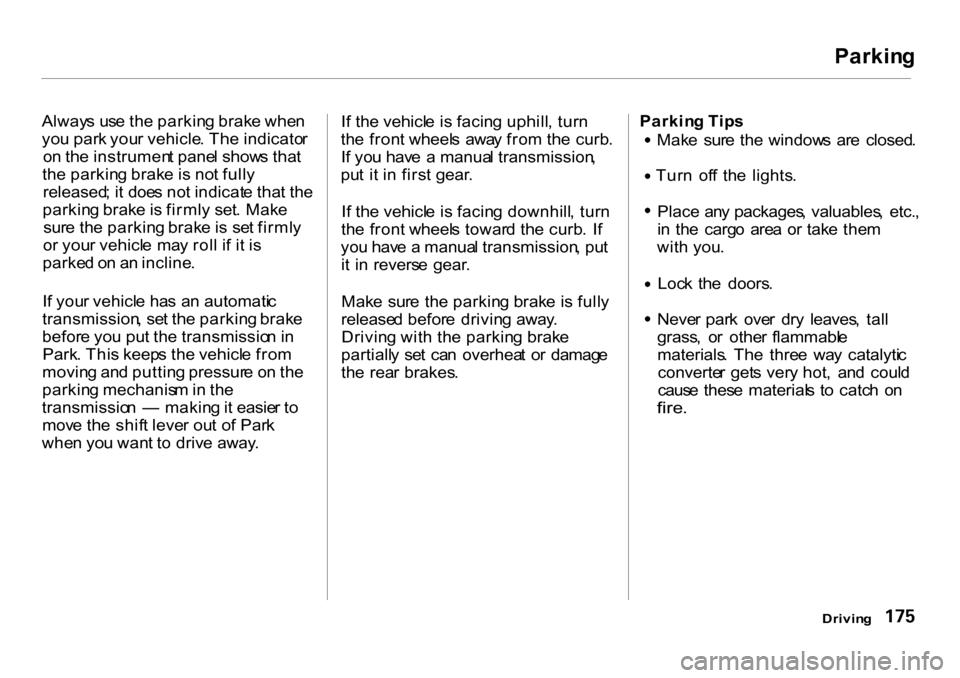
Parkin
g
Alway s us e th e parkin g brak e whe n
yo u par k you r vehicle . Th e indicato r
o n th e instrumen t pane l show s tha t
th e parkin g brak e is no t full y
released ; i t doe s no t indicat e tha t th e
parkin g brak e is firml y set . Mak e
sur e th e parkin g brak e is se t firml y
o r you r vehicl e ma y rol l i f i t i s
parke d o n a n incline .
I f you r vehicl e ha s a n automati c
transmission , se t th e parkin g brak e
befor e yo u pu t th e transmissio n in
Park . Thi s keep s th e vehicl e fro m
movin g an d puttin g pressur e o n th e
parkin g mechanis m in th e
transmissio n — makin g it easie r t o
mov e th e shif t leve r ou t o f Par k
whe n yo u wan t t o driv e away . I
f th e vehicl e i s facin g uphill , tur n
th e fron t wheel s awa y fro m th e curb .
I f yo u hav e a manua l transmission ,
pu t i t i n firs t gear .
I f th e vehicl e i s facin g downhill , tur n
th e fron t wheel s towar d th e curb . I f
yo u hav e a manua l transmission , pu t
i t i n revers e gear .
Mak e sur e th e parkin g brak e i s full y
release d befor e drivin g away .
Drivin g wit h th e parkin g brak e
partiall y se t ca n overhea t o r damag e
th e rea r brakes . Parkin
g Tip s Mak
e sur e th e window s ar e closed .
Tur n of f th e lights .
Place any packages , valuables , etc. ,
i n th e carg o are a o r tak e the m
wit h you .
Loc k th e doors .
Neve r par k ove r dr y leaves , tal l
grass , o r othe r flammabl e
materials . Th e thre e wa y catalyti c
converte r get s ver y hot , an d coul d
caus e thes e material s t o catc h o n
fire .
Driving
Page 180 of 326

Th
e Brakin g Syste m
You r Hond a is equippe d wit h fron t
dis c brakes . Th e brake s o n th e rea r
wheel s ar e drum . Th e brakin g
syste m is power-assiste d t o reduc e
th e effor t neede d o n th e brak e pedal .
Pu t you r foo t o n th e brak e peda l onl y
whe n yo u inten d t o brake . Restin g
you r foo t o n th e peda l keep s th e
brake s applie d lightly , causin g the m
t o buil d u p heat . Hea t build-u p ca n
reduc e ho w wel l you r brake s work . I t
als o keep s you r brak e light s on all
th e time , confusin g driver s behin d
you .
Constan
t applicatio n o f th e brake s
whe n goin g clow n a lon g hil l build s
u p hea t an d reduce s thei r effective -
ness . Us e th e engin e t o assis t th e
brake s b y downshiftin g t o a lowe r
gea r an d takin g you r foo t of f th e
accelerato r pedal .
Chec k you r brake s afte r drivin g
throug h dee p water . Appl y th e
brake s moderatel y t o se e i f the y fee l
normal . I f not , appl y the m gentl y an d
frequentl y unti l the y do . Sinc e a
longe r distanc e is neede d to sto p
wit h we t brakes , b e extr a cautiou s
an d aler t i n you r driving . Brak
e Wea r Indicator s
Th e fron t dis c brake s o n al l vehicle s
hav e audibl e brak e wea r indicators .
Whe n th e brak e pad s nee d replacing ,
yo u wil l hea r a distinctiv e metalli c
"screeching " soun d whe n yo u appl y
th e brakes . I f yo u d o no t hav e th e
brak e pad s replaced , the y wil l begi n
screechin g al l th e time .
You r brake s ma y sometime s squea l
o r squea k whe n yo u appl y the m
lightly . D o no t confus e thi s wit h th e
brak e wea r indicators . The y mak e a
ver y audibl e "screeching. "
Drivin g